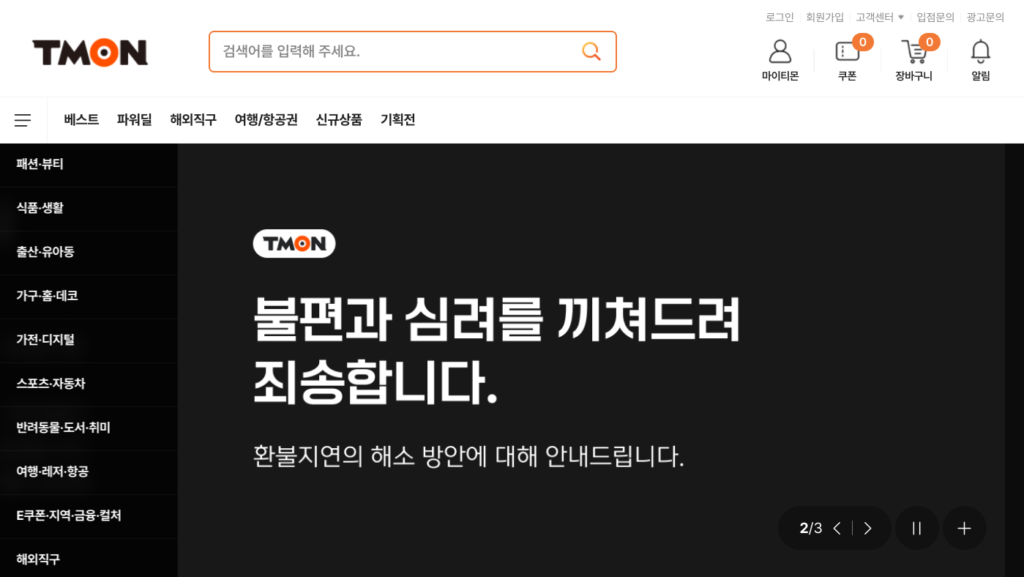Two big e-commerce platforms in South Korea have experienced serious downturns in their liquidity in the past few weeks, delaying their payments to vendors or refunds for customers’ undelivered orders.
The services are WeMakePrice and TMON, whose mother company is Qoo10 Group, headquartered in Singapore. Since the group’s first successful e-commerce market, GMarket launched in South Korea in 2000, it has been running e-commerce businesses across Asia, including Malaysia, Indonesia, and South Korea.
Reports of delayed vendor payouts on both platforms began to spread in early July. The group then claimed that there was a technical glitch within the system. However, most payments have not been made to this day, and the South Korean government estimates unpaid money to hover at 210 billion won (US$152 million).
Angry customers and sellers visited the offices of the two platforms last week, demanding responsible actions. Reports say that the liquidity crisis of two marketplaces would have affected more than 60,000 sellers, and it may influence other South Korean platforms that Qoo10 owns, such as AK Mall and Interpark Commerce.
As more people voiced concerns about the marketplaces, South Korea’s Financial Services Commission carried out a joint investigation with them and urged for solutions on 25 July. On 29 July, the two platforms filed corporate rehabilitation in the Seoul Bankruptcy Court.
Furthermore, Qoo10 plans to sell WeMakePrice to Chinese e-commerce giants like AliExpress and Temu, which have secured a bigger user base than the platform in South Korea, according to local reports.
The CEO and founder of Qoo10, Ku Young-bae, was banned from travelling outside South Korea from 30 July. Ku stated that the group currently has a maximum liquidity of 80 billion won within the group but cannot guarantee if it can utilise all of the assets to settle the current situation.
On 1 August, the headquarters of the two marketplaces and Ku’s home were raided by prosecutors for further investigation.
How Did This Happen?
WeMakePrice and TMON have been eclipsed by the growth of Chinese marketplaces in the past couple of years. The two saw a significant decrease in the number of users in February 2024 compared to the same month last year, 1,160,000 and 610,000, respectively, according to online service analysis agency WiseApp. In contrast, Chinese entries like AliExpress and Temu added 4,630,000 and 5,810,000 users each.
Despite deteriorating sales, the mother company made acquisitions between 2023 and 2024, such as AK Mall and InterPark Commerce. Most recently, the group acquired American marketplace Wish at 230 billion won.
As the acquisitions happened over a short period, many questioned the sources of money that Qoo10 was using. Some suggested that the group must be delivering liquid assets by delaying their payouts to the vendors.
The group changed its rollout date in October 2023 – amid the acquisition spree – and postponed passing on payments, starting with international vendors and then to domestic sellers on WeMakePrice, TMON, Interpark Commerce and Books.
As of today, no transaction is available on WeMakePrice and TMON.

Call for Solutions
In South Korea, the amount of transactions on online marketplaces has increased by approximately 340 times, from 660 billion won in 2020 to 227 trillion won in 2023. Despite the growth, the South Korean government did not have specific regulations stating delays in vendor payment for online market platforms. Some also pointed out there should have been more rigorous monitoring of liquidity situations of online marketplaces to have prevented the Qoo10 crisis.
A preceding case signalled the worsened market situation among online shopping platforms. In June 2024, Babosarang, one of the well-known stationery marketplaces in the country, closed its business and cut communications with vendors without prior notice. The platform also did not give noticed payments to their merchants.
The pandemic may have played a role in the bad finance of these platforms, too. The growth rate of transactions has been on a constant decrease since 2021, and recorded 8.4 per cent in 2023, which was the lowest percentage in the preceding three years. What’s worse, the share of the e-commerce company Coupang has been only growing over time, taking up more than 74 per cent in 2023.
“We learned the poor conditions of the oversized e-commerce industry through the WeMakePrice and TMON incident,” an e-commerce official told Yonhap. “What we need now is a regulatory system that well understands the size and ecosystem of the industry.”


